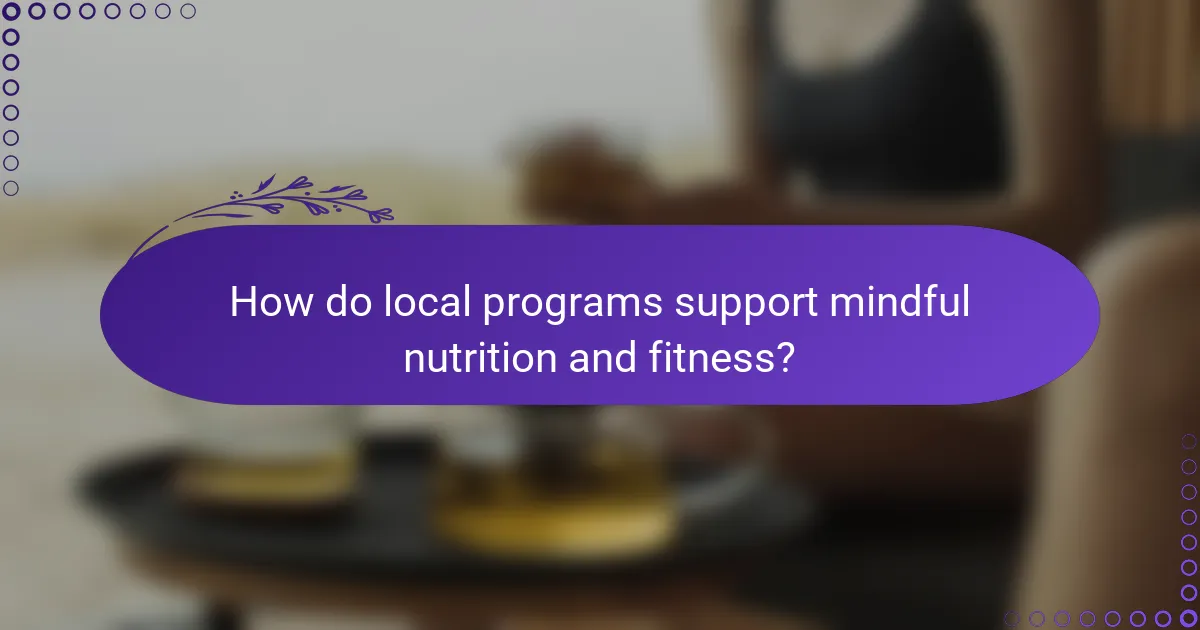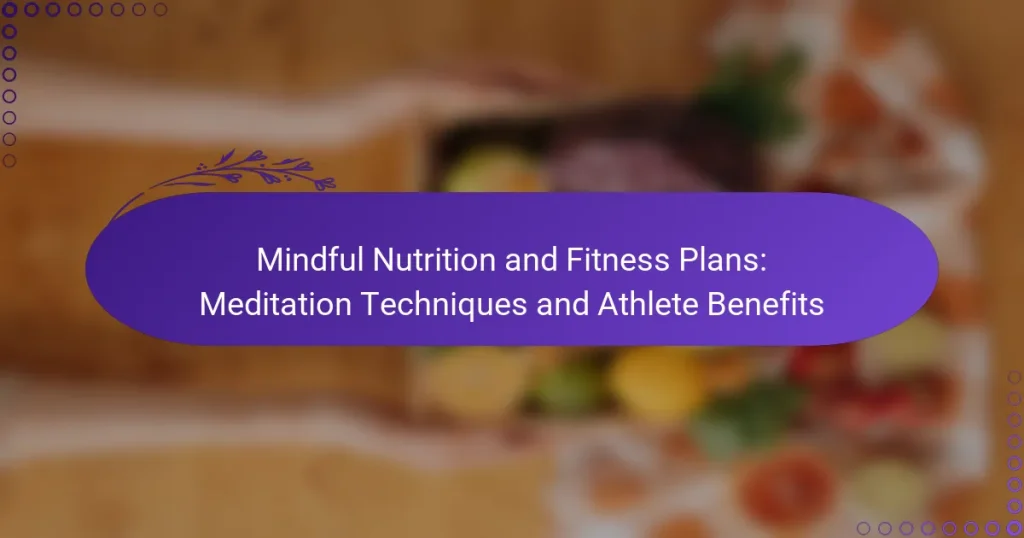Mindful nutrition and fitness plans are essential for athletes seeking to enhance their performance and well-being. By prioritizing whole, nutrient-dense foods and incorporating effective meditation techniques, athletes can improve their focus, reduce stress, and optimize their energy levels. This holistic approach not only supports physical capabilities but also fosters mental clarity and emotional resilience, ultimately leading to better recovery and overall health.

How can mindful nutrition enhance athletic performance?
Mindful nutrition can significantly enhance athletic performance by promoting better food choices, optimizing energy levels, and improving recovery times. By focusing on the quality and timing of nutrition, athletes can maximize their physical capabilities and mental clarity.
Improved energy levels
Mindful nutrition helps athletes maintain consistent energy levels throughout their training and competitions. By consuming a balanced diet rich in whole foods, such as fruits, vegetables, lean proteins, and healthy fats, athletes can fuel their bodies effectively. Timing meals and snacks around workouts can also prevent energy dips and sustain performance.
For instance, incorporating complex carbohydrates like whole grains before training can provide sustained energy, while protein-rich snacks post-exercise can aid in recovery. Athletes should aim to eat every 3-4 hours to keep energy levels stable.
Enhanced recovery
Proper nutrition plays a crucial role in recovery, allowing athletes to bounce back faster after intense workouts. Mindful eating practices, such as prioritizing anti-inflammatory foods like berries, nuts, and fatty fish, can reduce muscle soreness and speed up healing. Hydration is equally important; athletes should drink water and electrolyte-rich beverages to replenish lost fluids.
Incorporating a recovery meal within 30 minutes post-exercise, which includes both protein and carbohydrates, can significantly enhance muscle repair. This could be a smoothie with protein powder and a banana or a chicken salad with quinoa.
Better focus during training
Mindful nutrition can improve an athlete’s focus and mental clarity during training sessions. Foods rich in omega-3 fatty acids, such as salmon and walnuts, support brain health and cognitive function. Staying hydrated is also essential; even mild dehydration can impair concentration and reaction times.
To maintain focus, athletes should consider incorporating foods that stabilize blood sugar levels, such as nuts and seeds, into their snacks. Avoiding high-sugar foods that can lead to energy crashes is also advisable for sustained mental performance.

What are effective meditation techniques for athletes?
Effective meditation techniques for athletes include mindfulness meditation, guided visualization, and breath control exercises. These practices enhance focus, reduce stress, and improve overall performance by fostering mental clarity and emotional resilience.
Mindfulness meditation
Mindfulness meditation involves paying attention to the present moment without judgment. Athletes can practice this technique by focusing on their breath or bodily sensations during training sessions, which helps to cultivate awareness and reduce distractions.
To get started, find a quiet space and sit comfortably. Spend a few minutes observing your breath, allowing thoughts to come and go without engaging with them. Aim for sessions of 5-15 minutes daily to build consistency.
Guided visualization
Guided visualization is a technique where athletes imagine themselves succeeding in their sport, enhancing motivation and confidence. This method can be particularly effective before competitions, as it helps to mentally rehearse performance and reduce anxiety.
To practice, find a quiet environment and close your eyes. Visualize yourself executing your sport perfectly, engaging all your senses to make the experience as vivid as possible. Regular sessions of 10-20 minutes can help solidify these mental images.
Breath control exercises
Breath control exercises focus on regulating breathing patterns to promote relaxation and concentration. Athletes can use techniques such as diaphragmatic breathing or box breathing to enhance their performance and manage stress levels.
For diaphragmatic breathing, inhale deeply through your nose, allowing your abdomen to expand, then exhale slowly through your mouth. Practice this for 5-10 minutes to improve lung capacity and calm the mind. Box breathing involves inhaling for a count of four, holding for four, exhaling for four, and holding again for four, which can be repeated several times to stabilize emotions and enhance focus.

How to create a mindful nutrition plan?
Creating a mindful nutrition plan involves focusing on whole, nutrient-dense foods while being aware of your body’s hunger and fullness cues. This approach encourages a balanced intake of macronutrients and emphasizes hydration, leading to better overall health and performance.
Incorporate whole foods
Whole foods are minimally processed and rich in nutrients, making them essential for a mindful nutrition plan. Focus on incorporating a variety of fruits, vegetables, whole grains, lean proteins, and healthy fats into your meals. Aim for at least five servings of fruits and vegetables daily to ensure a broad spectrum of vitamins and minerals.
When shopping, consider choosing organic options for produce that is heavily sprayed with pesticides. This can enhance your nutrient intake while reducing exposure to harmful chemicals. Meal prepping with whole foods can also help you stay on track and avoid processed snacks.
Balance macronutrients
Balancing macronutrients—carbohydrates, proteins, and fats—is crucial for optimal energy levels and overall health. A common guideline is to aim for a distribution of approximately 45-65% carbohydrates, 10-35% protein, and 20-35% fats in your daily caloric intake. Adjust these ratios based on your activity level and specific fitness goals.
For example, athletes may benefit from higher protein intake to support muscle recovery, while those focused on endurance might prioritize carbohydrates for sustained energy. Keep in mind that not all fats are created equal; prioritize unsaturated fats found in nuts, seeds, and avocados over saturated and [censured] fats.
Stay hydrated
Staying hydrated is a key component of a mindful nutrition plan, as proper hydration supports digestion, energy levels, and overall bodily functions. Aim to drink at least 2-3 liters of water daily, adjusting for factors like exercise intensity and climate. A good rule of thumb is to consume about half your body weight in ounces of water each day.
Incorporate hydrating foods such as cucumbers, watermelon, and oranges into your diet to boost your fluid intake. Be mindful of signs of dehydration, including fatigue, dry mouth, and dark urine. Setting reminders to drink water throughout the day can help you maintain adequate hydration levels.

What are the benefits of combining fitness and meditation?
Combining fitness and meditation offers numerous advantages, enhancing both physical performance and mental well-being. This integration can lead to a more balanced lifestyle, promoting overall health and resilience.
Reduced stress levels
Engaging in both fitness and meditation can significantly lower stress levels. Physical activity releases endorphins, which improve mood, while meditation helps calm the mind and reduce anxiety. Together, they create a powerful tool for managing stress effectively.
To maximize stress reduction, consider incorporating a short meditation session after your workout. Even five to ten minutes of mindfulness can help solidify the calming effects of exercise.
Increased mental clarity
Combining fitness with meditation enhances mental clarity, allowing for sharper focus and improved cognitive function. Regular physical activity increases blood flow to the brain, while meditation trains the mind to concentrate better.
For best results, try high-intensity workouts followed by mindfulness practices. This combination can lead to heightened awareness and better decision-making throughout the day.
Improved emotional resilience
The integration of fitness and meditation fosters emotional resilience, helping individuals cope with challenges more effectively. Exercise can boost self-esteem and confidence, while meditation encourages emotional regulation and self-awareness.
To build emotional strength, set aside time each week for both activities. Aim for at least 150 minutes of moderate exercise and a few sessions of meditation to cultivate a resilient mindset.

How do local programs support mindful nutrition and fitness?
Local programs play a crucial role in promoting mindful nutrition and fitness by providing resources, community support, and structured activities. These initiatives help individuals integrate healthy eating and exercise into their daily lives, fostering a holistic approach to well-being.
Community workshops
Community workshops offer hands-on experiences that educate participants about mindful nutrition and fitness practices. These sessions often cover topics like meal planning, cooking demonstrations, and stress management techniques, allowing attendees to learn practical skills in a supportive environment.
For example, a workshop might focus on preparing quick, nutritious meals using local ingredients, which can encourage healthier eating habits. Participants can also share their experiences and challenges, fostering a sense of community and accountability.
Group fitness classes
Group fitness classes provide an engaging way to incorporate physical activity into a routine while promoting mindfulness. These classes often include various formats, such as yoga, Pilates, or high-intensity interval training, allowing individuals to choose what best suits their preferences and fitness levels.
Joining a group class can enhance motivation and commitment, as participants benefit from the energy of others. Many local gyms and community centers offer classes at different times, making it easier to find a schedule that fits individual lifestyles.
Nutrition counseling services
Nutrition counseling services offer personalized guidance to help individuals make informed dietary choices. Registered dietitians or nutritionists can assess a person’s unique needs and create tailored meal plans that align with their fitness goals and lifestyle.
These services may include one-on-one sessions, group discussions, or online consultations, providing flexibility for clients. Common pitfalls, such as fad diets or misinformation about nutrition, can be addressed, ensuring that individuals receive evidence-based advice to support their health journey.

What criteria should you consider when choosing a mindful nutrition program?
When selecting a mindful nutrition program, consider factors such as program accreditation, the expertise of instructors, and the alignment of the program with your personal health goals. These criteria help ensure that the program is credible, effective, and tailored to your needs.
Program accreditation
Program accreditation is crucial as it indicates that the nutrition program meets specific standards set by recognized organizations. Look for programs accredited by reputable bodies such as the Academy of Nutrition and Dietetics or similar entities in your country.
Accredited programs often provide evidence-based practices and are more likely to be recognized by health professionals. This can be particularly important if you plan to use the program for weight management, athletic performance, or overall wellness.
Before enrolling, verify the accreditation status through the organization’s website or contact them directly. This step ensures that you are investing in a program that adheres to industry standards and best practices.

